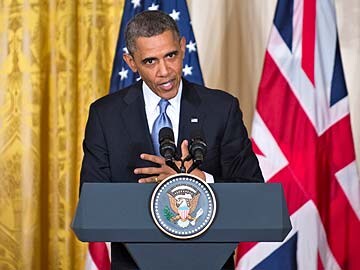
File photo of US President Barack Obama at a press conference in Washington on May 13, 2013 (AP)
Washington:
The Obama administration has raised concerns about the value of China's currency but declined again to accuse Beijing of manipulating it. But it had sharp criticism for Germany, a traditional ally, saying that the country needs to do more to rebalance growth in Europe and the global economy.
The administration said Wednesday that China's currency, the renminbi, remains "significantly undervalued." Officials said, however, that China's actions do not meet the legal requirements for the country to be designated a currency manipulator. That designation would trigger intensive negotiations and could ultimately lead to trade sanctions.
The administration criticized Germany for maintaining a large trade surplus throughout the euro-area debt crisis. The report said that Germany's surplus was larger than China's trade surplus in 2012 and this is causing trouble for its European neighbours.
It urged Germany to push for more domestic-led growth rather than relying so much on exports to fuel its economy. This would have the advantage of providing markets to boost the exports of Germany's neighbours and other countries.
"Germany's anaemic pace of domestic-demand-led growth and dependence on exports have hampered rebalancing," the administration said.
The criticism came in a twice-a-year treasury report on whether any nations are manipulating their currencies to gain trade advantages.
The report did say that the administration planned to closely monitor Japan's currency policies and those of South Korea.
Referring to China's renminbi currency, the administration said, "The RMB is appreciating but not as fast or by as much as needed. Treasury will carefully monitor the pace of RMB appreciation and press for further policy changes consistent with market determination of the exchange rate."
The report also cautioned Japan about its currency policies. Japan's central bank this year launched a new effort to bolster the country's economy. That effort has weakened the value of the Japanese yen and could widen the US-Japan trade gap.
U.S. manufacturers have long contended that China is manipulating its currency to gain trade advantages. A weaker Chinese renminbi and a weaker Japanese yen make goods from those two countries cheaper for American consumers and U.S. goods more expensive in those markets.
Treasury said it would discourage South Korea's government from intervening in currency markets unless such action is needed to stabilize disorderly markets. Seoul intervened to sell its own currency, the won, this year and last year to keep the value of its currency from rising.
The Obama administration has now declined to brand China as a manipulator for 10 straight reports. It has argued that it the U.S. is more likely to make progress on economic issues through negotiation than confrontation.
America's trade deficit with China has for years been the largest with any country.
The last time the United States named any country as a currency manipulator was in 1994 when the Clinton administration made that accusation against China.
The administration said Wednesday that China's currency, the renminbi, remains "significantly undervalued." Officials said, however, that China's actions do not meet the legal requirements for the country to be designated a currency manipulator. That designation would trigger intensive negotiations and could ultimately lead to trade sanctions.
The administration criticized Germany for maintaining a large trade surplus throughout the euro-area debt crisis. The report said that Germany's surplus was larger than China's trade surplus in 2012 and this is causing trouble for its European neighbours.
It urged Germany to push for more domestic-led growth rather than relying so much on exports to fuel its economy. This would have the advantage of providing markets to boost the exports of Germany's neighbours and other countries.
"Germany's anaemic pace of domestic-demand-led growth and dependence on exports have hampered rebalancing," the administration said.
The criticism came in a twice-a-year treasury report on whether any nations are manipulating their currencies to gain trade advantages.
The report did say that the administration planned to closely monitor Japan's currency policies and those of South Korea.
Referring to China's renminbi currency, the administration said, "The RMB is appreciating but not as fast or by as much as needed. Treasury will carefully monitor the pace of RMB appreciation and press for further policy changes consistent with market determination of the exchange rate."
The report also cautioned Japan about its currency policies. Japan's central bank this year launched a new effort to bolster the country's economy. That effort has weakened the value of the Japanese yen and could widen the US-Japan trade gap.
U.S. manufacturers have long contended that China is manipulating its currency to gain trade advantages. A weaker Chinese renminbi and a weaker Japanese yen make goods from those two countries cheaper for American consumers and U.S. goods more expensive in those markets.
Treasury said it would discourage South Korea's government from intervening in currency markets unless such action is needed to stabilize disorderly markets. Seoul intervened to sell its own currency, the won, this year and last year to keep the value of its currency from rising.
The Obama administration has now declined to brand China as a manipulator for 10 straight reports. It has argued that it the U.S. is more likely to make progress on economic issues through negotiation than confrontation.
America's trade deficit with China has for years been the largest with any country.
The last time the United States named any country as a currency manipulator was in 1994 when the Clinton administration made that accusation against China.
Track Latest News Live on NDTV.com and get news updates from India and around the world

